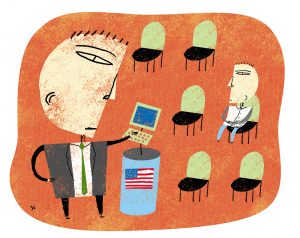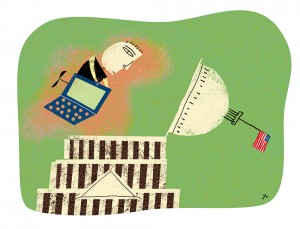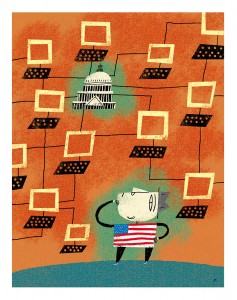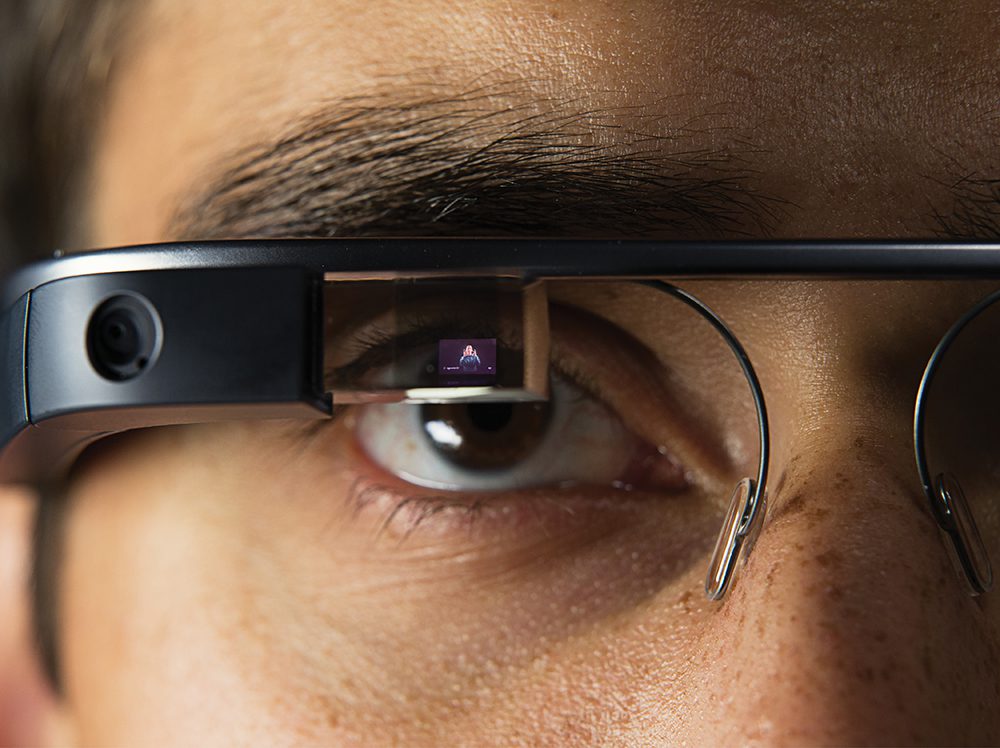When I was an undergraduate at BYU, then-Senator Edmund Muskie, a Democrat from Maine, spoke in the Wilkinson Center Ballroom. He told a story about shaking hands with an elderly woman and asking for her vote. She replied that she never voted for candidates because it only encouraged them.
Although humorous, her cynical approach to politics is becoming all too familiar today. Public opinion surveys have shown widespread dissatisfaction with current American political institutions and processes. The vast majority of Americans believe politicians do not care about them,1 and most people say they trust the federal government only some of the time or not at all.2
These attitudes have not always been so prevalent. In 1964 29 percent of the public believed government was run only for a few big interests. By 1996 that figure had skyrocketed to 70 percent! While in 1964 only three of 10 people believed “quite a few” government officials were crooked, in 1996 44 percent believed that. And two-thirds of people in 1996 believed that “public officials don’t care what people think,” compared with one-third who thought that way in 1964.3
This shift in public trust has worried many observers of the American political scene.4 Political scientists Seymour Martin Lipset and William Schneider have claimed that increasing cynicism is a “crisis of legitimacy, a loss of faith” in the American political system.5
A PROPOSED SOLUTION
Increasingly, scholars, pundits, politicians, and journalists are turning to new communications technology, such as the Internet, as a nostrum for reducing cynicism.6One scholar predicts that “the information technology revolution may . . . help government get closer to people, and when people feel a closer connection to government, confidence tends to be higher.”7 Another claims the Internet “will do by way of electronic pathways what cement roads were unable to do, namely,connect us rather than atomize us, put us at the controls of a ‘vehicle’ and yet not detach us from the rest of the world.”8
Certainly the Internet has potential for playing a role in a democracy. While 10 years ago the Internet was familiar to a small circle of academics and computer scientists, today nearly two-thirds of Americans 12 years old and older have used the Internet in the last year; almost half of those people say they go online every day.9Five years ago, when I first required students to use the Internet and e-mail to complete and submit assignments, I faced a revolt from about one-third of the class who had no interest in using the Internet or learning how to send e-mail. Today, e-mail addresses are freely exchanged and it is the rare student who is not online. The Internet has impacted education. And it has affected other facets of life, from how business is conducted to where people do their work to the nature of social interaction.
Politics has been affected as well. In a growing number of communities government services are going online—automobile registration, tax payment, and voter registration can all be done from a home computer. Therefore, why can’t the Internet also be a mechanism for facilitating political participation? According to political scientist Anthony Corrado, online communication holds the potential to “promote the type of interaction between voters and elected officials that is largely missing from modern politics.”10 Benjamin Barber predicts that “modern telecommunications technology can be developed as an instrument for democratic discourse at the regional and national level.”11 According to Barber, this new technology can “strengthen civic education, guarantee equal access to information, and tie individuals and institutions into networks that will make real participatory discussion and debate possible across great distances.”12 A common view is that these networks will be themeans for educating the electorate and perhaps closing the gap between politicians and the public.13
Even further, the Internet has been touted as the vehicle for creating a new political system in America. The Internet, some say, would achieve what has long been advocated by many ardent populists—a direct democracy where the people, not representatives, make decisions about public policy.
The structure of the Internet would suggest that such a role is possible: The discussion agenda can be set by common citizens through their own Web sites or online interactions, and, theoretically, any individual can go online and have the same input in public debate as any other person. According to vice president Al Gore, “no computer is ‘above’ any other . . . neither IBM nor the White House has any special advantage over a 15-year-old clever enough to set up his own connection. Class, hierarchy, and even physical location count for nothing on the Internet.”14
The easy accessibility of information and the ability to contact public officials instantaneously would seem to bode well for increased political participation by ordinary citizens. According to retired broadcast executive Lawrence Grossman, the Internet is making the previously passive into political activists. He states: “In kitchens, living rooms, dens, bedrooms, and workplaces throughout the nation, citizens have begun to apply such electronic devices to political purposes, giving those who use them a degree of empowerment they never had before.”15 Corrado suggests that future citizens of the wired republic “will have the capacity to take legislative decision making into their own hands by initiating proposals and considering public referendums electronically.”16
Since the Internet has the capability to register and transmit users’ opinions quickly and effectively, direct democracy actually could occur via online communication. The Internet has the potential to foment a revolution in American politics.
THE INTERNET’S POLITICAL REALITY
Yet that is not what is happening with the Internet, nor is it likely to happen in the future. The arguments that the Internet will be a revolutionary tool stimulating political participation assume significant and unlikely shifts in public attitudes. They also ignore the facts about how people really use the Internet. An Unlikely Assumption. First, the lofty predictions of an Internet-led political revolution assume something quite unusual—dramatic changes in human behavior. Corrado admits that the success of new technology as a democratic tool depends on “the willingness of significant numbers of citizens to take advantage of these extraordinary new tools to engage in meaningful political discourse, become better informed voters, and get more involved in civic life.”17
An Unlikely Assumption. First, the lofty predictions of an Internet-led political revolution assume something quite unusual—dramatic changes in human behavior. Corrado admits that the success of new technology as a democratic tool depends on “the willingness of significant numbers of citizens to take advantage of these extraordinary new tools to engage in meaningful political discourse, become better informed voters, and get more involved in civic life.”17
However, there is no evidence such a change will occur. The scenario of an active, informed electorate gathering information and expressing opinions electronically is accurate for some individuals—those who are already politically interested and motivated. For that group, the Internet is becoming a tremendous boon in the process of collecting information, interacting with policy makers, and, indeed, shaping policy. The protests at the World Trade Organization meeting in Seattle last year show the ability of the Internet to help mobilize an intense group of political activists. A small network of protesters coordinated the Seattle demonstrations primarily through e-mail and linked Web sites.
But for the majority who are less politically interested, such a scenario is unreal. These people will not be more likely, just because of a technological innovation, to suddenly acquire an interest in politics and become involved. As Russell Neuman has noted, “the mass citizenry, for most issues, simply will not take the time to learn more or understand more deeply, no matter how inexpensive or convenient further learning may be.”18
Granted, some individuals do become mobilized. And the portrait of the common citizen armed with information, capable of intelligently lobbying elected officials and changing the course of policy, is alluring. Greater citizen awareness and participation are ideal outcomes in democracies. Certainly, these actions should be encouraged, applauded, fostered. But they are rare; they will truly be exceptions, not the rule. Moreover, such activities are not prompted by the existence of a new technology or the ready availability of information.
Internet Usage. Second, the argument that the Internet will educate the less politically knowledgeable about politics and then stimulate their political participation may be flawed. Indeed, the opposite may be true. In the 1960s and 1970s, before cable and satellite, when the president of the United States made a speech on television, all three major networks cancelled other programming. For television viewers there were few other options. But the Internet is very different. Political sites are a small fraction of the available offerings online. And the user has complete control over where to go and how long to stay there. Politics can easily be avoided. For example, political Web sites attract thousands of visitors daily, but none of them is among the 100 most frequently visited sites online.19
Due to the fact that most Americans do not choose to become politically informed and engaged (except in rare circumstances), the Internet user’s ability to control may actually cancel out the supposed positive effects of readily available political information. Already, the majority of adult Americans do not watch national network television news regularly. More than four in 10 adults do not read a newspaper daily. Even those who do read newspapers often do so primarily for non-political news, such as sports, entertainment, and business happenings.20
The same patterns appear to be true for the Internet. Most Internet users go online for purposes other than politics. Moreover, that number—those not going online for politics—is growing. Initial Internet users were well educated, affluent, and more politically interested than the common person. Now, as Internet usage expands across the population, a new group of less politically interested (and therefore more ordinary) users is appearing. New users are more interested than longtime users in non-political information such as sports and entertainment. For example, while a majority of longtime users go online to follow up on a traditional media story, only 34 percent of new users do so (new users are defined as people who have started using the Web during the past six months). And these new users also are less likely than longtime users to use e-mail for political purposes.21
For many Internet users the Internet has work functions, personal communication advantages, or mere entertainment value, but it is not a tool for political participation. The commercial potential of the Internet is much more important to Americans than the political uses. And when the Internet deals with politics, citizens use it for information gathering much more than for political involvement. For example, while people may peruse sites of candidates, they rarely contact the candidates. One state legislative candidate found that less than 3 percent of visitors to his Web site actually used the e-mail link.
Of course, for some people, having an Internet choice will mean choosing not even to go online—now or in the future. This has been true for cable television, where even though 91 percent of U.S. households have access to cable, one-third of the population chooses not to be connected.22 The reasons for avoidance of the Internet may vary—lack of time, lack of perceived technological ability, unwillingness to pay—but the outcome will be the same. Many simply will not go online.
Familiar Gatekeepers. Finally, like other communications media, the Internet is becoming dominated by familiar sources. Undoubtedly, the Internet facilitates public expression, and such expression by individuals and new online-based groups will become more common. For the most part, however, the information that the public will obtain electronically will continue to come from the groups and individuals who currently dominate the political landscape, and it will not feature more interaction than now exists via other means.
This argument does not assume that all information will be channeled through the structures established by official entities, interest groups, or the news media. That is not true offline.Any individual or group can publish a newsletter or magazine, develop its own mailing list, and, therefore, reach other people. The Internet facilitates that activity. That will not change. But the forces dominating political news delivery in traditional media, who dwarf the independent efforts, also will overshadow others on the Internet. For their daily dose of news, consumers online will want to go to the New York Times,the Washington Post,or, more likely, a local newspaper site. For information on specialized topics, they will go to sites of groups they already belong to or are familiar with—the AFL–CIO, the Sierra Club, or the National Rifle Association. Although there will be many other options available, online users will choose these because they will be the sites most readily advertised, the users will already hold affiliation for them, and the sites will cater to the users’ information-gathering and processing needs. Such dominant forces from the offline world will become the primary information sources for Internet users as well and will continue to be the agenda setters for public policy.
But the forces dominating political news delivery in traditional media, who dwarf the independent efforts, also will overshadow others on the Internet. For their daily dose of news, consumers online will want to go to the New York Times,the Washington Post,or, more likely, a local newspaper site. For information on specialized topics, they will go to sites of groups they already belong to or are familiar with—the AFL–CIO, the Sierra Club, or the National Rifle Association. Although there will be many other options available, online users will choose these because they will be the sites most readily advertised, the users will already hold affiliation for them, and the sites will cater to the users’ information-gathering and processing needs. Such dominant forces from the offline world will become the primary information sources for Internet users as well and will continue to be the agenda setters for public policy.
THE UTILITY OF THE TOOL
One incontrovertible fact ensures that the Internet will not revolutionize political participation: Americans will not be different people just because there are now resources at their disposal to follow politics quite closely. And because the Internet is not prone to stimulating political participation among those not currently participating, it is unlikely to produce direct democracy.
The danger lies in the illusion that we havecreated direct democracy. There will be calls to use the Internet to institute referenda or originate initiatives to shape public policy. Citizens will be encouraged to express their preferences via an online election. Finally, those results will be tabulated and trumpeted as the public will.
But they will not reflect the public will. They will be the expressions of an intense minority of political activists who use this mechanism to voice their opinions. The majority will not participate because of a lack of time or motivation to research the issues.
However, even this danger is remote because mediating institutions, which are features of representative democracy, are not going away merely because the Internet exists. Instead, Congress, the executive branch, and state governments are all adapting to the Internet. They are utilizing the Internet to carry out functions they have long carried out in other settings. They are adapting, not disappearing, in the Internet age.
These conclusions may be depressing to those who have hoped that the Internet would improve politics. The proposed revolution sounds appealing: The online public would actually direct public policy; political participation would be reinvigorated; elected representatives would be more accountable and less able to “get away with” bad, self-interested policy decisions.
Despite the fact that the Internet will not cause these changes, the Internet does have the potential to be a positive force, although not necessarily a revolutionary one. The Internet hasaffected politics. And it will continue to do so.
A possible future effect is the facilitation of voting. With appropriate security checks against fraud, the Internet could be useful for facilitating the vote for those who are unable to go to a polling place on election day. There is something wonderfully communal about walking to the local elementary school or other public building, or even someone’s home, to stand in line with neighbors to cast a vote. Yet with frequent business travel or immobility, not everyone can do so. Some states, such as Oregon and Texas, have already moved toward mail voting. The Internet could be another option.
But the greatest effect likely has been and will be on those who are most involved in politics already. For others, if the Internet serves primarily as an information source when voters want information, it will have political utility for the large percentage of the public that is politically semi-attentive.
The numbers of Internet users extracting campaign-related information increased during the current presidential campaign. During the presidential primary season earlier this year, an estimated 17 percent of Internet users went online to get campaign information. Yet after the 2000 primaries were over, those seeking campaign information dipped to 3 percent.23 That surge and decline process is natural. When voters no longer need to make an immediate decision, they return to their regular (and likely far more interesting) activities.
Rather than suggest some flaw in the public or the system, this rhythm demonstrates that people are using the Internet rather than being used by it. They seek information when they need to make judgments, and then they go on with their lives. This cycle also suggests that, even though political information is easily accessible, citizens do not want such information all the time. This disinterest would doom the implementation of direct democracy.
In sum, the Internet is a tool to serve individuals’ needs. Those who seek political information will find the Internet a fitting instrument. For those who wish to become politically involved, the Internet will be a valuable resource. However, the Internet is not a panacea for our political system’s flaws, nor can it radically alter Americans’ traditional disinterest in politics. The cures for public cynicism must be found elsewhere. ![]()
NOTES
1. Virginia Sapiro, Steven J. Rosenstone, and the National Election Studies, National Election Studies, 1998: Post-Election Study[data set] (Ann Arbor, Mich.: University of Michigan, Center for Political Studies [producer and distributor], 1999).
2. “Deconstructing Distrust: How Americans View Government,” Pew Research Center for the People & the Press, Mar. 10, 1998 (https://www.people-press.org/trustrpt.htm).
3. Sapiro, Rosenstone, and the National Election Studies, National Election Studies, 1998.
4. See, for example, Daniel Yankelovich, Coming to Public Judgment: Making Democracy Work in a Complex World (Syracuse, N.Y.: Syracuse University Press, 1991).
5. Seymour Martin Lipset and William Schneider, The Confidence Gap: Business, Labor, and Government in the Public Mind (New York: Free Press, 1983), p. 4.
6. See Benjamin R. Barber, A Place for Us: How to Make Society Civil and Democracy Strong (New York: Hill and Wang, 1998); and Benjamin Barber, Strong Democracy: Participatory Politics for a New Age (Berkeley, Calif.: University of California Press, 1984).
7. Joseph S. Nye Jr., “Introduction: The Decline of Confidence in Government,” in Joseph S. Nye Jr., et al, Why People Don’t Trust Government (Cambridge, Mass.: Harvard University Press, 1997), p. 18.
8. Stephen G. Jones, “Information, Internet, and Community,” in Stephen G. Jones, ed., Cybersociety 2.0: Revisiting Computer-Mediated Communication and Community (Thousand Oaks, Calif.: Sage, 1998), p. 3.
9. “Two-Thirds of Americans Online,” study by ACNielsen, included on CyberAtlas, May 10, 2000 (https://cyberatlas.internet.com/big_picture/demographics/).
10. Anthony Corrado and Charles M. Firestone, eds., Elections in Cyberspace: Toward a New Era in American Politics (Washington, D.C.: The Aspen Institute, 1996), p. 29.
11. Barber, Strong Democracy,p. 274.
12. Barber, Strong Democracy,p. 274.
13. F. Christopher Arterton, Teledemocracy: Can Technology Protect Democracy?(Newbury Park, Calif.: Sage, 1987); Lawrence Grossman, The Electronic Republic (New York: Penguin Books, 1995); and Gary W. Selnow, Electronic Whistle-Stops: The Impact of the Internet on American Politics (Westport, Conn.: Praeger, 1998), pp. 191–203.
14. “Who Speaks for Cyberspace?” Economist,Jan. 14, 1995, p. 69.
15. Grossman, The Electronic Republic,p. 146. Though most Internet users do not employ this technology for political communication, a minority do. A survey in 1996 found that 17 percent of Internet users had sent e-mail to groups, organizations, or public officials. See “One-in-Ten Voters Online for Campaign ’96,” Pew Research Center for the People & the Press, Dec. 16, 1996 (https://www.people-press.org/tec96sum.htm).
16. Corrado and Firestone, Elections in Cyberspace,p. 16.
17. Corrado and Firestone, Elections in Cyberspace,p. 29.
18. W. Russell Neuman, The Future of the Mass Audience (Cambridge, U.K.: Cambridge University Press, 1991), p. 109.
19. See https://www.100hot.com/directory/100hot/.
20. See Princeton Survey Research Associates survey, Feb. 20–23, 1997, and John Consoli, “Good News, Bad News,” Editor & Publisher,May 3, 1997, p. 18.
21. “One-in-Ten Voters Online for Campaign ’96,” Pew Research Center for the People & the Press (https://www.people-press.org/tec96sum.htm). See also “The Internet News Audience Goes Ordinary,” Pew Research Center for the People & the Press, Jan. 14, 1999 (https://www.people-press.org/tech98sum.htm).
22. U.S. Census Bureau, “Household and Family Characteristics,” Current Population Reports,series P20-495, March 1996; and S.M.A.R.T (Systems for Measuring and Reporting Television), “T.V. Ownership Survey,” Statistical Research, Inc., June 16, 1997.
23. See The Vanishing Voter Project (https://www.vanishingvoter.org).
Feature










